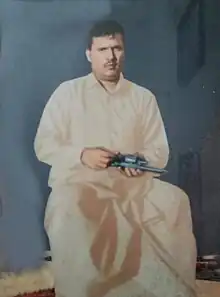Jagga Gujjar
Jagga Gujjar (1940 - 3 July 1968) was a bandit in Lahore, Pakistan during the 1950s and 1960s. He was very famous for the tax he imposed on the well to do called 'Jagga Tax'. A chunk of the money so extracted, was spent on the welfare of the poor, by him. He was a resident of Lahore's area Islamia Park , near Chauburji.[1]
Jagga Gujjar جگا گوجر | |
|---|---|
 Jagga Gujjar in 1968 | |
| Born | Chaudhry Muhammad Sharif Gujjar 1940 |
| Died | 3 July 1968 |
| Nationality | |
| Known for | Introducing personal tax called 'Jagga Tax' |
| Opponent | Achha Shukar Wala |
| Parent | Chaudhry Bhuddha Khan Raees Gujjar |
Beginning
How Gujjar became a sign of terror is an interesting story. There used to be a famous annual fair in Lahore's Islamia Park area during the 1950s. His brother Makhan Gujjar had a quarrel with famous outlaw of the time namely Achha Shukar Wala who belonged to Lahore's locality Qila Gujar Singh. Later, Makhan was murdered in 1954. Gujjar was only 14-year-old at the time of his brother's murder. Within eight days, Gujjar avenged the murder of his brother and killed the murderer. After this, Gujjar landed in jail. When he was in jail, he came to know that real man behind his brother's murderer was Achha who had hired the murderer for the purpose. Now, he planned murder of Achha from the jail walls. As per his planning, an attempt on life of Achha was made. As a result, two people were killed but Achha survived though injured.
While he was in jail, his foe Achha got reported patronage of the then governor of West Pakistan, Amir Muhammad Khan. The governor especially used Accha in quelling anti-government demonstrations in Lahore. [2]
Release from jail
Gujjar was realised from the jail on early parole in January 1968. By that time, General (Retd) Muhammad Musa Khan had become the governor of West Pakistan. When he came out of the jail, he was received by a large crowd at the city's Mozang Chowk.
He got married after coming out of the jail.
End
After coming out of jail, Gujjar organized a gang and started collecting forced tax from the butcher community. This tax got the name of 'Jagga Tax'. In Pakistan, even today this type of tax is called 'Jagga Tax'. The center of his highhandedness was Lahore's Bakra Mandi (cattle market) area where he collected rupee one (Re 1) from every butcher on purchase of one goat. Finally, Gujjar along with his accomplice Raju Gujjar was killed in an encounter with police near his home in Nawan Kot area of Lahore in July 1968. The next day's newspapers published the news of his murder very prominently. The police party who killed them was given Rs 300 in reward. Fateh Khan Bandial was Lahore's deputy commissioner while Haji Habib ur Rehman, superintendent of police at that time.[3]
In popular culture
Name Jagga was already being used in the titles of Punjabi films before Gujjar's death like 'Jagga' (1958). After his death, a number of Punjabi language movies were made on topic of Gujjar starting from 1970s by the Lahore's film industry. Some of films having either Jagga or Gujjar in their titles included 'Bala Gujjar' (1973), 'Jagga Gujjar' (1976), 'Wehshi Gujjar' (1979), 'Gujjar', 'Jagga Tay Shera' (1984), 'Putar Jaggay Da' (1990), 'Jagga Tax' (2002) and 'Buddha Gujjar' (2002). Some of these movies were made by the family members of Jagga Gujjar who entered in the film business after he was killed. The noted film makers of this family include Chaudhry Miraj Din and Chaudhry Imtiaz Gujjar. It is interesting to note that their rival family had entered the business of movie making much before them and also made a number of good films. Famous film makers of the rival family include Achha Shukar Wala himself and Kamran Chaudhry. Their most famous was 1965 film Malangi. Both the families have since ended their enmity.[4]
References
- "Who was Jagga Gujjar? The word "Jagga Tax" is famous on his name". The Asian Mirror. 2023-09-24. Retrieved 2023-10-19.
- Bin Rashid, Hashim (2012-11-25). "Goonda raj". The Express Tribune. Retrieved 2023-10-19.
- https://www.pakistanlink.org/Commentary/2021/July21/02/01.HTM
- "جب لاہور میں دہشت کی علامت جگا گجر کو ہلاک کرنے والی پولیس پارٹی کو تین سو روپے انعام دیا گیا". BBC News اردو (in Urdu). Retrieved 2023-10-19.